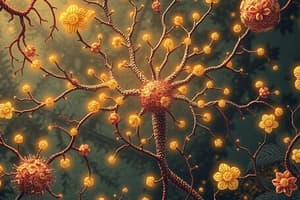Podcast
Questions and Answers
¿Qué tipo de fármacos dirigidos por el texto se enfocan en proteínas específicas en vías de señalización intracelular?
¿Qué tipo de fármacos dirigidos por el texto se enfocan en proteínas específicas en vías de señalización intracelular?
- Antibióticos
- Inhibidores de la quinasa de proteínas (correct)
- Inmunosupresores
- Analgésicos
¿Cuál es uno de los objetivos de la farmacología del sistema nervioso central según el texto?
¿Cuál es uno de los objetivos de la farmacología del sistema nervioso central según el texto?
- Comprender las bases moleculares y celulares de trastornos neurológicos y psiquiátricos (correct)
- Desarrollar nuevos tratamientos para enfermedades cardiovasculares
- Estudiar los efectos de los fármacos en el sistema inmunológico
- Analizar la interacción de los fármacos con el sistema respiratorio
¿Qué tipo de medicamentos pueden afectar principalmente el sistema nervioso central, como se menciona en el texto?
¿Qué tipo de medicamentos pueden afectar principalmente el sistema nervioso central, como se menciona en el texto?
- Anticonvulsivantes (correct)
- Analgésicos
- Antibióticos
- Inmunosupresores
¿Cuál es la importancia de comprender la farmacología del sistema nervioso central para los prescriptores, según el texto?
¿Cuál es la importancia de comprender la farmacología del sistema nervioso central para los prescriptores, según el texto?
¿Qué tipo de medicamentos están dirigidos hacia el sistema inmunológico según el texto?
¿Qué tipo de medicamentos están dirigidos hacia el sistema inmunológico según el texto?
¿Cuál es el objetivo principal del estudio de la neurofarmacología según el texto?
¿Cuál es el objetivo principal del estudio de la neurofarmacología según el texto?
¿Cuál es la función principal del sistema nervioso central (CNS)?
¿Cuál es la función principal del sistema nervioso central (CNS)?
¿Qué categoría de fármacos actúa mediante la unión a receptores de neurotransmisores?
¿Qué categoría de fármacos actúa mediante la unión a receptores de neurotransmisores?
¿Qué tipo de fármacos modulan la síntesis o degradación de neurotransmisores?
¿Qué tipo de fármacos modulan la síntesis o degradación de neurotransmisores?
¿Cuál es el papel de los fármacos que actúan sobre los canales iónicos en el CNS?
¿Cuál es el papel de los fármacos que actúan sobre los canales iónicos en el CNS?
¿Qué aspecto del CNS estudia la farmacología del sistema nervioso central?
¿Qué aspecto del CNS estudia la farmacología del sistema nervioso central?
¿Qué funciones se ven afectadas por los fármacos que modulan la síntesis o degradación de neurotransmisores?
¿Qué funciones se ven afectadas por los fármacos que modulan la síntesis o degradación de neurotransmisores?
Flashcards are hidden until you start studying
Study Notes
Central Nervous System Pharmacology
The central nervous system (CNS) is the seat of the neural activities of the human body. It consists of the brain and the spinal cord. The CNS is responsible for processing sensory information, controlling voluntary and involuntary muscle movement, and coordinating behavior and thought. Pharmacology, the study of drug action, plays a crucial role in understanding the mechanisms underlying CNS function and dysfunction. Central nervous system pharmacology encompasses the study of drugs that modulate CNS activity, either directly or indirectly.
Drugs acting on the CNS can be classified based on their mechanisms of action, which can be broadly categorized into:
- Neurotransmitter modulation: These drugs act by binding to neurotransmitter receptors, either enhancing or inhibiting their function. Examples include antipsychotics, antidepressants, and anxiolytics.
- Ion channel modulation: These drugs target specific ion channels, such as voltage-gated sodium channels, which are crucial for the propagation of action potentials in nerve cells. Examples include local anesthetics and anticonvulsants.
- Neurotransmitter synthesis and degradation: These drugs modulate the synthesis or degradation of neurotransmitters, thereby altering their availability in the synaptic cleft. Examples include monoamine oxidase inhibitors and cholinesterase inhibitors.
- Modulation of intracellular signaling pathways: These drugs target specific proteins involved in intracellular signaling pathways, which are critical for neuronal function. Examples include protein kinase inhibitors and G protein-coupled receptor modulators.
- Immune modulation: These drugs target the immune system, which plays a role in the development of neurodegenerative diseases such as multiple sclerosis and Alzheimer's disease. Examples include immunosuppressive agents and cytokine modulators.
Central nervous system pharmacology is also closely related to the study of neuropharmacology, which is concerned with the effects of drugs on the nervous system as a whole, including the peripheral nervous system. Some drugs, such as local anesthetics and anticonvulsants, primarily affect the CNS, while others, such as those used to treat inflammatory conditions, may have more widespread effects on the nervous system.
Central nervous system pharmacology plays a crucial role in the development of therapeutic agents for various neurological and psychiatric disorders, including epilepsy, depression, anxiety, and schizophrenia. It also contributes to our understanding of the molecular and cellular basis of these disorders, which can inform the development of novel treatments.
Understanding the pharmacology of CNS drugs is essential for prescribers, as it helps them choose appropriate drugs and dosages for their patients. It also provides a basis for developing new drugs with improved safety and efficacy profiles. As our knowledge of CNS pharmacology continues to grow, we can expect to see more advanced treatments for a wide range of neurological and psychiatric conditions.
Studying That Suits You
Use AI to generate personalized quizzes and flashcards to suit your learning preferences.




